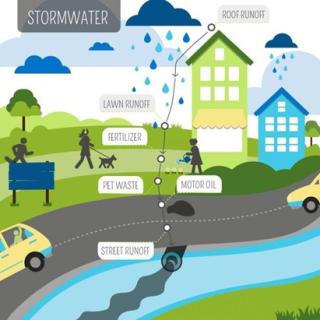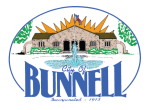City of Bunnell Stormwater (MS4)
(MS4 Permit) Education
Posted on: August 16, 2023 - 9:38am


Stormwater (MS4)
What is Stormwater?
Stormwater, also spelled storm water, is water that originates during precipitation events and snow/ice melt. Stormwater can soak into the soil, be held on the surface and evaporate, or runoff and end up in nearby streams, rivers, or other water bodies.
Polluted stormwater runoff is commonly transported through municipal separate storm sewer systems (MS4s), and then often discharged, untreated, into local water bodies.
An MS4 is a conveyance or system of conveyances that is:
- owned by a state, city, town, village, or other public entity that discharges to waters of the U.S.,
- designed or used to collect or convey stormwater (e.g., storm drains, pipes, ditches),
- not a combined sewer, and
- not part of a sewage treatment plant, or publicly owned treatment works (POTW).
The 1999 Phase II regulation requires small MS4s in U.S. Census Bureau defined urbanized areas, as well as MS4s designated by the permitting authority, to obtain National Pollutant Discharge Elimination System (NPDES) permit coverage for their stormwater discharges. Phase II also includes non-traditional MS4s such as public universities, departments of transportation, hospitals, and prisons.
To prevent harmful pollutants from being washed or dumped into MS4s, certain operators are required to obtain NPDES permits and develop stormwater management programs (SWMPs). The SWMP describes the stormwater control practices that will be implemented consistent with permit requirements to minimize the discharge of pollutants from the sewer system.
What is Illicit Discharge
Defined as "any discharge into a municipal storm sewer system that is not composed entirely of stormwater".
Examples:
- Fertilizers
- Yard Waste
- Paint
- Gasoline / Motor Oil
- Pesticides / Weed Killers
- Detergents & Soaps
- Cooking Grease
Keep an eye out for inappropriate ("illicit") amounts of discharge from stormwater pipes, especially during dry weather. This could be a sign that there is a problem and should be reported to your local municipality.
How You Can Help
- Use pesticides, herbicides & fertilizers SPARINGLY and away from storm drains & ditches
- DO NOT pour household cleaners, oil, or paints on driveways or into storm drains
- DO NOT blow leaves or dump lawn/yard trimmings into storm drains
- PICK UP litter
- DO NOT store or expose materials to rain that could “wash off” into storm drains or streets
- NEVER pour oil or antifreeze down or near a storm drain, or onto street
- Properly dispose of hazardous materials at 1700 S. Old Kings Rd, Flagler Beach. Details on free drop off can be found on the Flagler County website: Hazardous Waste Collection Facility
Report Illicit Discharges
Within the City Limits, report the following:
- Witnessing someone drop litter
- Oil sheen in a body of water
- Leaves or grass clippings deposited in or near storm drains
- Sewage odor from a storm drain, inlet, or body of water
- Spills or dumping of oil, paint, household cleaners, antifreeze, pesticides, or fertilizers
- Discharge of chlorinated swimming pool water to a storm drain
- Sediment tracking from construction sites into streets
- Illegal dumping (at sites where regular garbage and trash is not picked up)
- Witnessing anything being disposed of into a storm drain
If illegal dumping or pollutants within waterways, culverts or storm drains is observed, we encourage residents to contact the City’s Infrastructure Department at (386) 437-7515 or email us at stormwater@bunnellcity.us. All Stormwater related complaints should be reported to this phone number or email address.
Please visit https://www.bunnellcity.us/infrastructure/pages/stormwater-ms4 for more information.
####

